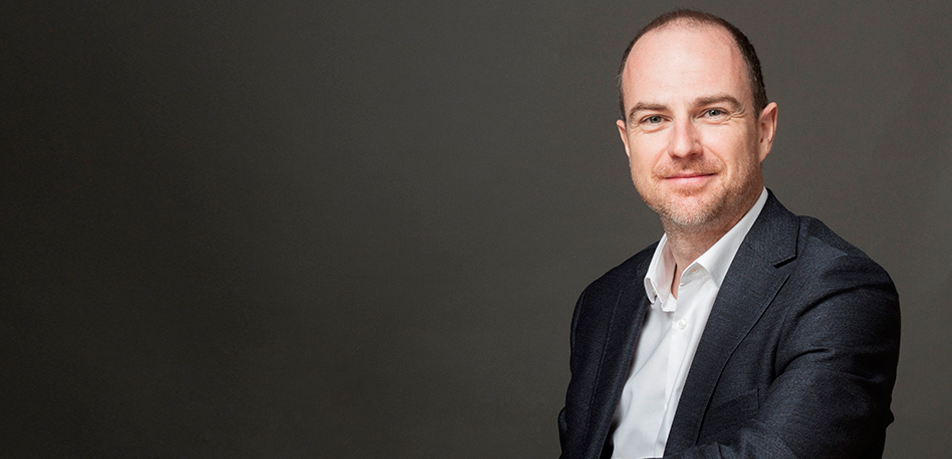MASTERS OF WINE (II)

Andreas Kubach studied in Madrid and Germany and was headed for a career in corporate management. Then he happened to land his first job at a winery, which marked a turning point in his life.
“I basically took the job, because it provided me with a level of responsibility and independence that would never have been possible in the automotive sector or at a consultancy firm. Fortunately, I chose wine, and I had excellent mentors who not only taught me how to manage wineries but also make and sell wine.”
Clearly there was no going back...
“It becomes a passion when you realize everything that goes into making a bottle of wine; the ability to bottle time and a piece of the place where it came from. What is incredible is that after working in wine for 25 years, it seems even more fascinating now then when I first started!”
Andreas managed a smooth transition—not without effort—and turned his professional legacy and passion into a way of life. It was the cornerstone of a successful career that has now culminated in the ambitious Master of Wine (MW) title.
[[{"fid":"18394","view_mode":"default","fields":{"format":"default","alignment":"","field_file_image_alt_text[und][0][value]":false,"field_file_image_title_text[und][0][value]":false},"type":"media","field_deltas":{"2":{"format":"default","alignment":"","field_file_image_alt_text[und][0][value]":false,"field_file_image_title_text[und][0][value]":false}},"link_text":null,"attributes":{"height":998,"width":1802,"style":"height: 277px; width: 500px;","class":"media-element file-default","data-delta":"2"}}]]
Andreas Kubach during an appearance at the most recent edition of Salón de Gourmets (Madrid)
In his experience, the journey was the destination. “I saw the MW as a way of learning and growing as a person. I was well aware of the possibility that I might be among the 90% of students who never pass the exam and decided that I wouldn't worry about that. With this attitude, I learned more and really enjoyed the journey. But I won't deny that it was tough, especially in combination with a job that, in and of itself, demands a lot of energy and commitment.”
“The support of my family and colleagues was crucial. The MW program not only requires a lot of studying, traveling and wine tasting, but it forces you to leave your comfort zone, set your ego aside, get to know yourself and push your limits.”
In terms of his day-to-day, Andreas tries to divide his valuable time between Península Vinicultores (PV) and the program that he occasionally participates in as a speaker and educator. “At PV, we are a team of winegrowers, enologists and two MW (the other is my business partner, Sam Harrop) dedicated to comprehensive vineyard and winery management, as well as producing authentic, sustainable wines.”
“Perhaps what sets a MW apart is that he or she must have an excellent command of every aspect of the art and science of wine, from the vineyard to the glass, and a solid grasp of all wine regions and a wide range of disciplines.”
When the conversation turns to the relationship between wine and food, inspired by the lists he sometimes makes for good friends, Andreas offers an insightful analysis: “I'm a winemaker, I don't make lists, but I think in Spain we have a lot of work to do when it comes to wine lists. The selection should coincide conceptually with the restaurant, be dynamic and interesting, and contribute to both the customer's experience and the business' bottom line. The number of lists that achieve this is far higher in London or New York, for example.”
Staying with the international theme, certain attributes make a MW an excellent ambassador for the international promotion of a country's wines. The title confers an additional layer of visibility and credibility. Andreas works closely with many of the world's leading wine importers and distributors who trust his judgment when it comes to developing their portfolios. “I try to live up to their trust by expanding the Spanish wine selection with authentic, relevant wines that reflect the enormous diversity of our country while also offering something to local consumers.”
[[{"fid":"18395","view_mode":"default","fields":{"format":"default","alignment":"","field_file_image_alt_text[und][0][value]":false,"field_file_image_title_text[und][0][value]":false},"type":"media","field_deltas":{"3":{"format":"default","alignment":"","field_file_image_alt_text[und][0][value]":false,"field_file_image_title_text[und][0][value]":false}},"link_text":null,"attributes":{"height":745,"width":1500,"style":"height: 248px; width: 500px;","class":"media-element file-default","data-delta":"3"}}]]
At the most recent edition of Salón de Gourmets (Madrid). From left to right: M. Torres Maczassek (G.M. Familia Torres), Andreas Kubach (MW), Fernando Mora and Sergi Castro)
Andreas also accepts the responsibility of a MW in communicating wine culture. In fact, one of the institute's goals is to promote knowledge and excellence in the global wine community.
“We need to focus on wine as culture. We need to show people that wine is one of the best things in life, a form of cultural expression rooted in a specific place and tradition, like music, art, literature or gastronomy. I also think we should let go of the somewhat patronizing aspiration of ‘educating the consumer’.”
Andreas emphasizes the need for wineries to meet this wine ideal, paying attention to its cultural dimension and sense of place, and making wines that are worthy of this more complex interaction: “wines that not only seduce the palate, but the intellect and the heart as well.”
“Unsustainable production is unacceptable. In other words, an unsustainable wine cannot have a cultural dimension and therefore is not worth drinking.”
This inevitably brings us to the future. When we ask Andreas how he envisions the state of the wine sector 20 years from now, he again responds with an incisive analysis:
- Wine lovers will be more global and critical but also more open-minded, with fewer prejudices. They will demand wines that are authentic and sustainably produced.
- Wine as culture can play an important role in a constantly changing world, where something authentic, something with soul and personality, is more relevant than ever. Many vineyards will most likely suffer more frequent and longer-lasting droughts, which might require a paradigm shift.
- Certain areas obtain and tolerate yields that are excessive. Advanced viticultural systems, selecting varieties adapted to a specific climate, higher-altitude vineyards, deficit irrigation as an indicator of quality, etc. “Familia Torres is leading exemplary initiatives in these areas, which I think will have a very positive impact on the sector.”
Winegrowing faces a lot of challenges in the coming years, but with people like Andreas, the future also offers opportunities. We'll drink to that!
